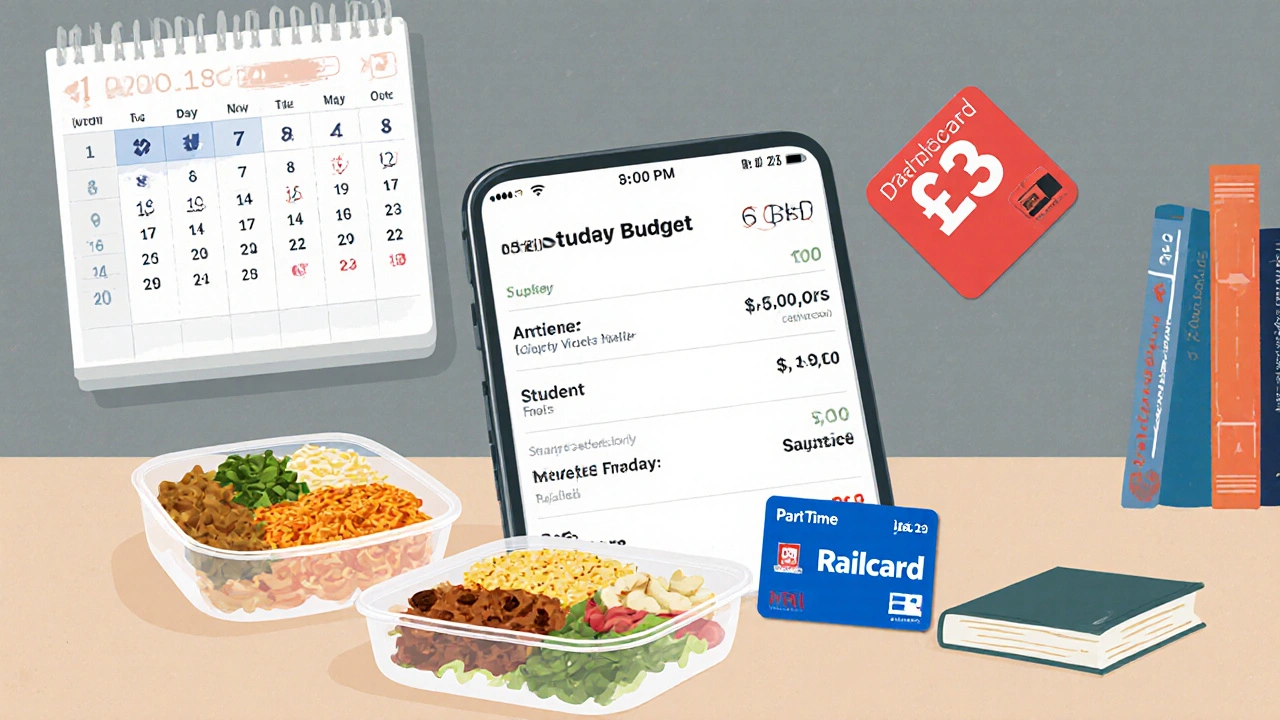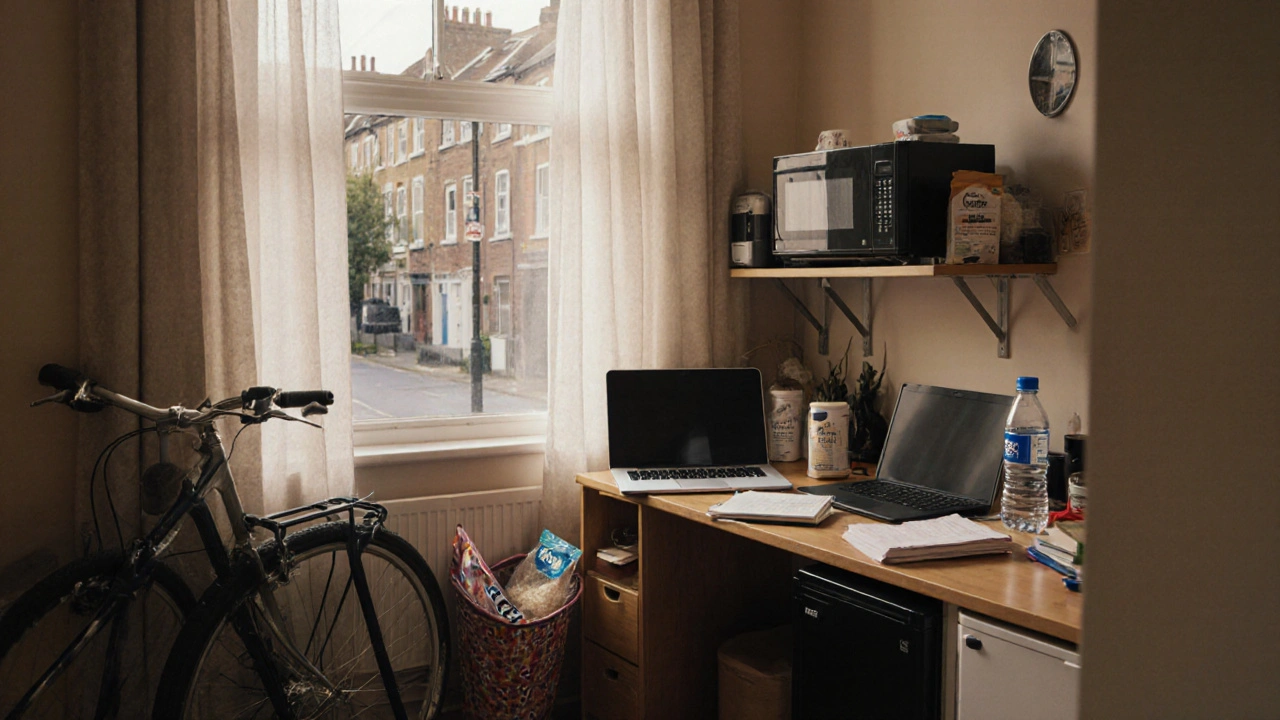If you're planning to study in London, you need to know one thing upfront: it's expensive. But it doesn't have to break you. With the right plan, you can live comfortably on a student budget-even in one of the world’s most costly cities. This isn’t about cutting corners or eating instant noodles every day. It’s about knowing where your money actually goes and making smart choices that add up over time.
Accommodation: The Biggest Bite
Housing eats up 40-50% of most students’ budgets in London. University halls are the easiest option, but they’re not always the cheapest. For 2025, expect to pay between £800 and £1,400 a month for a single room in a university-managed hall, depending on location and amenities. Places near central zones like Zone 1 or 2 (King’s Cross, Bloomsbury) cost more. Outside those zones-like Stratford, Croydon, or Walthamstow-you can find rooms for £650-£850.
Private rentals are cheaper if you share. A room in a 4-bedroom flat in Zone 3 might cost £700-£900, including bills. But watch out for hidden fees: deposits (usually 5 weeks’ rent), referencing checks (£30-£80), and agent fees (some still sneak them in). Always ask: Are utilities included? Many landlords now include water, internet, and electricity, which saves you £80-£120 a month.
Pro tip: Sign up for university housing early. Many schools lock in lower rates for students who accept offers before March. Waiting until July? You’ll pay more and get stuck in the worst locations.
Bills and Utilities: Don’t Ignore These
Even if your rent includes bills, you’ll still need to pay for your phone, streaming, and maybe laundry. A basic mobile plan with unlimited data and calls costs £15-£25 a month. EE, O2, and Tesco Mobile all have student deals. Avoid paying for premium Netflix or Disney+ if you’re on a tight budget. Use free options like BBC iPlayer (with TV license), YouTube, or join a house-sharing subscription.
Laundry? University halls usually have free or cheap machines. In private flats, expect to pay £1.50-£2.50 per wash. Do laundry once a week, not daily. That’s £6-£10 a month-not much, but it adds up if you forget.
Food: Eat Smart, Not Cheap
Food is where students can save the most-if they plan ahead. The average student spends £180-£250 a month on groceries. That’s not luxury, but it’s enough for balanced meals. Cook at home. Buy in bulk. Use discount apps like Too Good To Go (£1-£3 meals from cafes that would otherwise throw food away) or Olio (free food from neighbors).
Supermarkets matter. Aldi and Lidl are your friends. A loaf of bread: £1.10. A dozen eggs: £1.80. A bag of rice: £1.40. Compare that to Waitrose or Sainsbury’s, where the same items cost 30-50% more.
Meal prep saves time and cash. Cook a big pot of pasta or curry on Sunday. Eat it 3-4 times. No need to buy lunch every day. Student meal deals at supermarkets like Tesco or Asda cost £3-£4 for a sandwich, snack, and drink. That’s cheaper than a coffee and pastry from a café.
Don’t skip breakfast. Eating a bowl of cereal or toast before class means you won’t be tempted by a £5 sandwich at 11 a.m. Small choices make big differences.
Transport: Get the Right Card
London’s transport isn’t cheap, but students get huge discounts. A monthly Travelcard for Zones 1-3 costs £142.20. But if you’re under 18 or have a 18+ Student Oyster Card, you get 30% off. That drops it to £99.54. If you’re studying outside Zone 1-3, you can get a 16-25 Railcard for £30 a year. That gives you 1/3 off all National Rail journeys and some Tube trips.
Don’t use contactless payment unless you’re only traveling a few times a week. It doesn’t cap daily fares like Oyster does. Always use Oyster or contactless with a Student Discount loaded on it.
Walking or cycling? Free. London has over 2,000 Santander Cycles stations. First 30 minutes are free with a £2 deposit. Many universities also offer free bike repairs and storage.

Study Costs: Books, Printing, and Supplies
You don’t need to buy every textbook. Libraries are free. UCL, King’s, and LSE libraries have digital copies of 90% of required readings. Use your student login to access them from home.
Printing? Most universities give you £5-£10 free printing credit per term. Use it wisely. Print double-sided. Only print what you’ll actually read. Buy secondhand textbooks from student Facebook groups or sites like StudentBeans or Amazon’s used section. A £100 textbook can often be found for £20.
Don’t buy new stationery every month. A £3 notebook lasts 3-4 weeks. A pack of pens costs £1.50. These add up if you’re careless.
Entertainment and Social Life: It Doesn’t Have to Cost a Lot
London is full of free stuff. Museums? All major ones-Tate Modern, British Museum, National Gallery-are free. You can spend a whole day there without spending a penny. Check out free exhibitions, student nights, and open mic events. Many pubs and clubs offer £5 drink deals on student nights. Use Student Beans, UNiDAYS, or TotallyMoney for discounts on cinema tickets, gyms, and restaurants.
Join university societies. They’re cheap (often £5-£10 per term) and give you free events, trips, and meals. A hiking club might take you to the Cotswolds for £10. A film society watches movies for free in campus auditoriums.
Don’t feel pressured to go out every weekend. One night out a month-£15 for a drink and a bus home-is enough to stay social without draining your account.
Monthly Budget Snapshot (2025)
Here’s what a realistic student budget looks like in London this year:
- Accommodation (shared flat): £750
- Travel (Oyster with student discount): £100
- Food (groceries + occasional meal deal): £200
- Bills (phone, internet): £40
- Study supplies: £15
- Entertainment and social: £50
- Emergency fund / miscellaneous: £50
Total: £1,205 per month
That’s not luxury. But it’s doable. And it leaves room for a weekend trip, a new pair of shoes, or a surprise gift for a friend.

How to Stretch Your Money Further
Here are 5 real strategies students use to make their budget last:
- Get a part-time job on campus. Library assistants, lab helpers, and student ambassadors pay £12-£15/hour and often offer flexible hours.
- Apply for hardship funds. Every university has a small fund for students in financial difficulty. You don’t need to be broke to qualify-just struggling. Apply early.
- Use student discounts everywhere. Even at Boots, Superdrug, and JD Sports. You’d be surprised how much you save over a year.
- Share costs with flatmates. Split Netflix, buy groceries together, carpool to the airport.
- Track every pound. Use a free app like Moneyhub or Monzo. Seeing where your money goes is the first step to controlling it.
What Not to Do
Don’t fall for the ‘London student lifestyle’ myth. You don’t need to eat out every Friday. You don’t need the latest iPhone. You don’t need to be seen at every party. What you need is enough sleep, enough food, and enough cash to get through exams without stress.
Avoid payday loans. They look tempting when your student loan hasn’t arrived yet. But the interest can be 1,000%+ APR. Use your university’s financial advice service instead. They’ll help you set up a payment plan or apply for emergency support.
And never borrow money from friends unless you’re 100% sure you can pay it back. Trust is harder to rebuild than money.
Final Thought: It’s Manageable
London isn’t impossible for students. It’s just expensive. But with awareness, planning, and a few smart habits, you can live well without living in debt. Most students who succeed here aren’t the ones with the most money. They’re the ones who planned ahead, tracked their spending, and said ‘no’ to things that didn’t matter.
Your student loan isn’t meant to cover everything. It’s meant to cover the essentials. The rest? That’s where your choices make the difference.
How much should a student budget for rent in London?
Most students in London spend between £650 and £900 per month on rent if sharing a flat outside Zone 1. University halls cost more-£800-£1,400-but include bills. Always check if utilities are included and whether the deposit is refundable.
Is £1,500 a month enough to live as a student in London?
Yes, £1,500 is more than enough if you’re careful. That gives you £300 extra for travel, emergencies, or occasional treats. The average student spends around £1,200-£1,300. If you’re on a tighter budget, £1,000-£1,100 is possible with shared housing, cooking at home, and using student discounts.
Can I work while studying in London on a student visa?
Yes. Most student visas allow you to work up to 20 hours per week during term time and full-time during holidays. Jobs on campus are easiest to get and often flexible. Off-campus work is allowed too, but make sure your visa permits it-check with your university’s international office.
Are there any free food options for students in London?
Yes. Many universities host free meal events during orientation week. Apps like Too Good To Go offer discounted meals from cafes and restaurants that would otherwise throw food away. Some student unions run weekly free food pop-ups. Check your university’s website or Facebook groups for these.
How can I save on transport in London as a student?
Get a 18+ Student Oyster Card for 30% off Tube and bus fares. Use a 16-25 Railcard for 1/3 off National Rail trips. Walk or cycle when you can-Santander Cycles are free for the first 30 minutes. Avoid contactless payment unless you have a discount loaded on it.
Next steps: Apply for your student Oyster card now. Check your university’s hardship fund deadlines. Start tracking your spending with a free app. Your future self will thank you.
